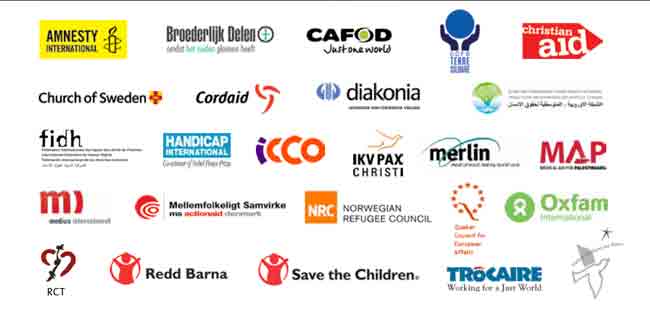"Dashed Hopes: Continuation of the Gaza Blockade" – a new report
Dashed Hopes: Continuation of the Gaza Blockade
A new briefing on the Gaza blockade
30 November 2010
Israel’s measures to ‘ease’ the illegal blockade of Gaza in the face of significant international pressure have done little to change the plight of Gaza’s civilians, says a report published today by an international coalition of development, human rights and peace-building organisations. They are calling for renewed international action to ensure an immediate, unconditional and complete lifting of the blockade.
This impressive coalition consists of:
Amnesty International UK, Broederlijk Delen, Cafod, CCFD-Terre Solidaire, Christian Aid, Church of Sweden, Cordaid, Diakonia, Europe-Mediterranean Human Rights Network (EUHRN), Handicap International, ICCO, IKV Pax Christi, International Federation for Human Rights (FIDH), Medical Aid for Palestinians (MAP), Medico International, Merlin, MS Action Aid Denmark, Norwegian Refugee Council (NRC), Quaker Council for European Affairs, Oxfam International, Rehabilitation and Research Centre for Torture Victims (RCT ), Redd Barna, Save the Children UK, Trocaire and UCP.
The report is quite short but very comprehensive, well-documented and telling. Here are its conclusions:
Recommendations to the International Community
Renewed international action to ensure an immediate, sustained and unconditional lifting of the blockade in line with international law is necessary.That includes allowing the movement of people into and out of Gaza, ending the ban on exports, allowing entry of construction materials including those for the private sector and raw materials, expanding operations of the crossings, lifting restrictions on fuel imports, and ensuring access to Gaza’s agricultural land and fishing grounds. Security for both Israeli and Palestinian civilians must be ensured and the authorities must be able to make legitimate security checks on goods and persons going through the crossings in accordance with international law. Reinstating and respecting the rule of international law and enabling positive, self sufficient futures for the people will create more not less security for the civilian populations in Israel and the occupied Palestinian territory.
Primary responsibility for ending the blockade and ensuring the welfare of Palestinian civilians lies with Israel as the occupying power, which controls Gaza’s air space, territorial waters, most crossing points and other important aspects of the lives of its inhabitants. The Hamas authorities in Gaza, the Palestinian Authority, and Egypt must also do their utmost to help Gaza’s civilian population. This includes the obligation of the Hamas authorities to stop and prevent all attacks against Israeli civilians immediately.
The international community must do its part to ensure that its repeated appeals to end the blockade are finally heeded.
1) Launch a new, concerted diplomatic initiative for an immediate, unconditional and complete lifting of the blockade, including:
• allowing movement of people including humanitarian staff into and out of Gaza;
• allowing exports from Gaza;
• allowing entry of construction materials including those for the private sector;
• allowing entry of raw materials;
• expanding operations of the crossings;
• lifting restrictions on fuel imports;
• ensuring access to Gaza’s agricultural land and fishing grounds and the protection of civilians in these areas.
2) Convene a meeting of the UN Security Council to review the implmentation of Resolution 1860 which emphasises “the need to ensure sustained and regular flow of goods and people through the Gaza crossings” and calls for “tangible steps towards intra-Palestinian reconciliation.” Further action necessary for its implementation should be considered.
3) Plan a visit to Gaza as part of every high-level visit to Israel and the occupied Palestinian territory.
4) State explicitly that the ongoing blockade is illegal under international law.
5) Support genuine investigations into, and accountability for, violations of international human rights and international humanitarian law committed by all parties, including the Israeli forces and Palestinian armed groups as a way to prevent future violations.
Download the full report

